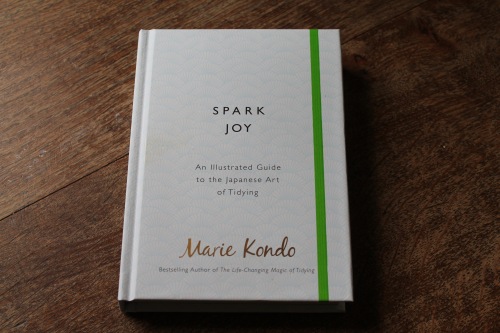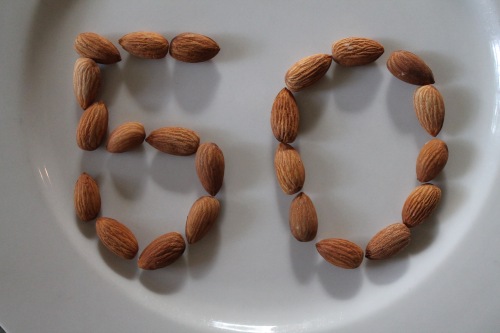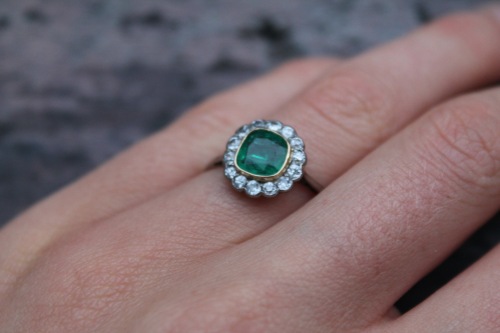clutter

As babies we find out a lot about the world we are born into by deciding what we want to swallow and what we want to spit out – the good from the bad, the delicious from the gross. Before we have words we put the world in our mouth. We love things by chewing on them. Our likes and dislikes, what we want and what we don’t, are sucked on or spurned. Whatever we can grab we mouth. Or we’ll just stare at it, lying on our backs in a nappy.
On growing up we quickly become expert in what we don’t want – our No is nearly always more energetically defended than our Yes. Our whole world, as children, is reassuringly black and white. Either we embrace it or we keep at bay. What is bad is yuk, to be mistrusted and quickly gotten rid of. What we love is hugged close – it’s wonderful, the answer to everything. Growing up involves marrying these impulses within ourselves and recognising that they say as much about us as the world around us – which is probably why growing up takes such a long time.
Establishing intimacy within our family, and then transferring some of this love on to trusted others, is lynchpin to our growing awareness that we exist in our own right. However there is also another a more private process that helps bring about this awareness, and that gets less attention. This is the process by which we seek and find satisfaction in the objects around us – food, toys, textures, plants, and clothes. In our early contact with objects we discover what we love enough to grasp, chew on and gaze at, and what, being of no interest, drops from our awareness.
As time goes by, within a good enough childhood, we discover that getting the things we want is the easy part. It’s the dramatic part, the exciting bit, the chase. This is where much of our energy and many of our fantasies dovetail. A light flashes in our eye, we go after whatever it is and, with any luck, we get it. Finding a home for our new find doesn’t come into it. Deciding whether it will get on with the things we already have is neither here nor there. Sometimes we’ll want something, a toy perhaps, purely on impulse, not caring for it deeply at all. In time however we may come to love it, looking after it and finding a home for it among the rest of our things.
One of the first things we are taught, once we’re old enough to be impressed on, is to look after our belongings. ‘Can you put away your things now?’ our mother asks, sternly or kindly it’s hard to tell. ‘Time to pack up,’ our teacher calls across the classroom, just as our fingers ooze with paint. ‘But where oh where is my bunny?’ we ask ourselves, frantically hunting under the bed and assuming it must be stolen.
Those of us who are lucky enough to be well taken care of as children get many of the things that we want as we grow up. They become ours – belongings which take their place among the rest of our things. Eventually many of these things end up in cupboards, baskets and on shelves. They sit alongside all of the other things that we want enough to keep, but not quite enough to leave out. More acquaintance than best friend, they are deeply familiar, yet not quite part of ourselves.
Months pass, then years. Childhood proper ends. As we make our way in the world, apart from things like clothes, books and kitchenware, we forget much of what we put away in cupboards, drawers, baskets and shelves. A book may sit unread on a top shelf for a long long time – what was once a vital source of meaning turns into mere decoration, a dust gatherer. Through no fault of its own an egg whisk may fall into disfavour at the back of a kitchen drawer. The longer our things spend inside a cupboard or on a shelf the less important they become. We may still want to keep them, yet our link to them fades.
Much of the early part of our life is bound up with wanting something and then going out to get it. Economically speaking this is called progress and is as natural as the air we breathe. Contrast this with sitting quietly in a room, taking out the entire contents of a cupboard and deciding, one by one, which things to put back and which can go forever. For most of us this doesn’t feel natural. It doesn’t feel pleasurable. It doesn’t feel mature. It doesn’t even feel like work in the straightforward sense. Although there is now a word, an ugly verb, for it – decluttering.
There are people who live their whole life in the same house, never moving a picture from one room to the next, never renewing their acquaintance with the egg whisk fallen to the back of the kitchen drawer. The same cutlery, serving spoons and sewing kit see them through from maturity unto death. However most of us are not like this. Most of us move home many times and go through multiple sets of cutlery before we are old. As a result most of us end up going through our cupboards and decluttering fairly regularly.
And then there are those, growing in number, who go through their things voluntarily with a view to kick starting a process of renewal from within. Inspired by a modern wave of decluttering these people intuit, if only as a hunch, that the belongings that they store in cupboards, drawers and shelves have the potential to hold them back and make them feel stuck. These people would rather not wait until forced by circumstance to decide what they love enough to keep and what they can as well let go of. They would rather not defer to the future, but to preempt it. I know this because I have a clutter-free sister, though I myself am not.
* * *
A couple of years ago my mother went into a nursing home, leaving her belongings for my sisters and me to divide between us. When I went to see her in the nursing home, late afternoon that same day, I found her agitated. ‘Did you get some things that you like?’ Mum asked, staring into my face as she clasped my hot hands to her cool ones. ‘Yes I did’, I assured her, ‘I got lots of lovely things’. As I listed them – her eyes showing surprise when I mentioned the family grandfather clock – her face softened. Her grip loosened and she sank down in her chair. One more load was off her mind, one more transfer of love. She stared out the window towards a tree I knew that her eyesight prevented her from seeing clearly. This, she was telling me without saying, was all that she could give me – a dining table, some paintings, cutlery, photos, vases and a rug.
And yet we both knew that these were big things. She wasn’t interested in their market value, for she had loved them for their beauty. She was grateful to them for helping her through her life. And, now that she was nearing the end, she hoped that they might bring beauty and support to my sisters and me. She took great comfort, in what turned out to be her final months, from knowing that her things had been shared among her family, and that her memory had found a home in bedrooms, sitting rooms and kitchens across Australia.
The next day I went back to Mum’s house, in the process of being sold, to put the things she’d left me into a pile to be transported interstate. However overnight something had happened. Surely there were fewer of them? Was some of their value stripped from them because they were no longer part of Mum’s house? Now they were just things piled up with my name written on white office stickers. The shimmering threads holding them in their rightful place had been cut. ‘What have we done?’ I wondered, feeling confused and tearful.
I wandered into the garden and poked my nose into Mum’s garden shed – typically tidy and spiderweb free. Eventually I recovered enough to think. Mum had left her house in order. Thanks to my younger sister Mum had not left piles of stuff for her family to sift through. She had left only the things that she cared about, plus a few out-of-reach boxes in the top of her wardrobe. She had left her daughters furniture, objects and paintings that she hoped we would take home and love. She couldn’t be around for us for ever. She had lived a good long life. But she could leave us some of her things in the hope that they’d remind us of a life well lived, and to inspire us to do the same.
I was thrilled to receive these things. But I was also appalled. I found the finality of it shattering. Not least now I would have to live up to owning the family dining table. Deeper older feelings came up too. Was this really, I asked tearfully, all that was left of my childhood – side tables and napkin rings and mustard dishes? Was I going to be big enough, brave enough, to give these things a place in my heart and home? Would I be able to prevent them turning into sentimental clutter? Would my own family, who hadn’t been brought up around these things, get them, love them?
Standing in the garden it seemed all wrong that Mum’s things had been plucked from the rooms where they’d been dusted and polished for decades, to be piled up for collection by an interstate courier who immediately demanded that I pay insurance on them. And yet this was exactly what happened.
* * *
We may struggle to articulate it, but we know that we have a responsibility to our things that goes beyond the material. We know this because, if only in fantasy, after a certain point our things start to possess us, rather than the other way round. One response to this is minimalism, the impulse to have as few things as possible to catch the eye, and a streamlined, one thing in, one thing out attitude to objects. Only those things that are functional and beautiful, as suggested by William Morris, only those things that spark joy on being held, as suggested by Marie Kondo, are kept. The rest is passed on or given away. Because the rest is excess.
When I was growing up in Adelaide living minimally was for a few bold souls who, my parents assumed, put social appearances before their own comfort. It was for people who liked thick plate glass windows and low slung hard-edged furniture. Equally when I was growing up clutter was hardly mentioned. It certainly didn’t have the moral tinge that it now has. A neighbour’s house might be described as cluttered when books and magazines were left strewn about. A cupboard might be perceived as cluttered if too many coffee mugs were stacked up inside it. But clutter didn’t have the power to point the finger that it currently has. The state in which someone left their belongings when they died had no significance. It said nothing important about them. A person’s belongings were just things, just as their cupboards were just cupboards.
* * *
It was well after midnight and my husband and I were lying in bed. I was staring at the ceiling and wishing that I had gotten to bed earlier, rather than falling asleep over a book on a rug downstairs. I knew that my husband couldn’t sleep either because now and then his feet twitched. ‘I read that Marie Kondo book you left on the stairs’, he said, into the darkness. ‘Oh yeah,’ I replied. ‘What did you think?’ ‘I found it quite seductive’, he said. ‘She seems amazingly unburdened by what other people might think of her ideas’. ‘Yes, that’s true’, I said. ‘I think it’s her naivety that I find so refreshing’.
There was a lull, during which I considered the wisdom of ending our conversation there. ‘Except’, he continued, ‘I found reading that book made me quite agitated because I think I share some of her obsessiveness’. ‘Do you mean that you would like our house to be tidier?’ I ventured, wishing we were both sound asleep. ‘Yes’, he said, ‘I know that it annoys you for me to say it, but I really do. There is a section in the book where she talks about other people’s mess. She says that you can only really clear up your own mess – can only organise your own things. After that you have to hope that other members of your family will get the hint and do something about their own mess. Except of course’, he ended punchily, ‘they don’t’.
Lying in the dark I told myself not to react. He rolled his shoulder to face away from me. ‘But what about your clothes cupboard’, I felt like saying to him, fuming, ‘which is always as messy as can be?’ A cool breeze blew through the open window. ‘But’, I said, unable to contain myself, ‘you know that I work my guts out in this house. You know that if I didn’t spend as much time as I do putting things away that it would be much much messier?’ He rolled back to face the ceiling. ‘And’, I said, ‘you know how much it winds me up to hear you say that our house is cluttered, when clearly it isn’t’.
‘Yes’, he said, ‘I’m sorry. But it really does get to me in a way that I don’t think you realise’. ‘And’, I went on as if he hadn’t spoken, ‘I think you also know that I’ll be devastated when our kids aren’t at home to make a mess anymore. And that I’d much rather have them here than have no clutter.’ By this point I was so incensed, and so worried about not sleeping given an early morning start, that I took myself off to our sofa bed next door.
That’s when it came to me, staring at the ceiling. My husband really does experience our house as messy. He really does see clutter where I see family life. He really would like to live minimally with clear surfaces and nothing left on the stairs, preferably along the lines that suit his aesthetic. It wasn’t even personal, it just was the way he experienced it.
Still sleep evaded me. Surely as a couple, I thought, we should be able to move beyond his right about clutter and my being wrong – or my being right about family life and his being wrong? Wasn’t it more that we experienced our home and our life within it differently? Just as he longed for symmetry in our garden, he would like more structure in our home life – for it to have a predictability and order that allowed him to focus on work. He would like his eye to slide over our sitting room without being tripped up by a badly darned rip in a favourite rug. It’s not just that we have different tastes, I thought to myself, lying in the dark. It’s that we approach the things and spaces that make up our home from very different places.
* * *
Really what we are talking about, when we experience a space as cluttered, is the impression that objects – that mass of our things and belongings – make in our unconscious. This is where we keep a private record of what matters. This is where we work out the hold that certain objects and spaces have over us. This is where we register what is truly valuable to us. And this is where what might once have been a small trivial thing – a rip in a rug or a grandfather clock – becomes an agitating sleeplessness-making thing.
This explains why being in control of our home surroundings is so important to us. And why one person’s clutter is rarely another’s. This is why when my husband comes into our kitchen at the end of a Sunday afternoon, he sees nothing but a messy kitchen table, I see a productive afternoon spent crafting and cooking.
However naïve Marie Kondo may sound sentence by sentence – in giving her socks feelings and making her belongings animate – she is clearly on to something. She understands that our belongings are an intimate part of us, and that we are in some ways responsible for the role they play in our lives. She knows that no-one but ourselves can deal with our belongings, and that when we fail to deal with them they come to possess us in a way that can lead us to feel stuck. She knows that, within a couple, one person’s belongings are forever at risk of becoming the other person’s clutter. She knows about the disloyalty I feel about our family grandfather clock sitting mute under our stairs, for fear of its echoing tick-tock. She knows that our things can lift us up or pull us down, and that the quality of our relationship to them determines whether we love them, respect them or bag them up for charity. She knows that however much we may put off dealing with our things, telling ourselves it doesn’t matter, that in our heart we know it does.


